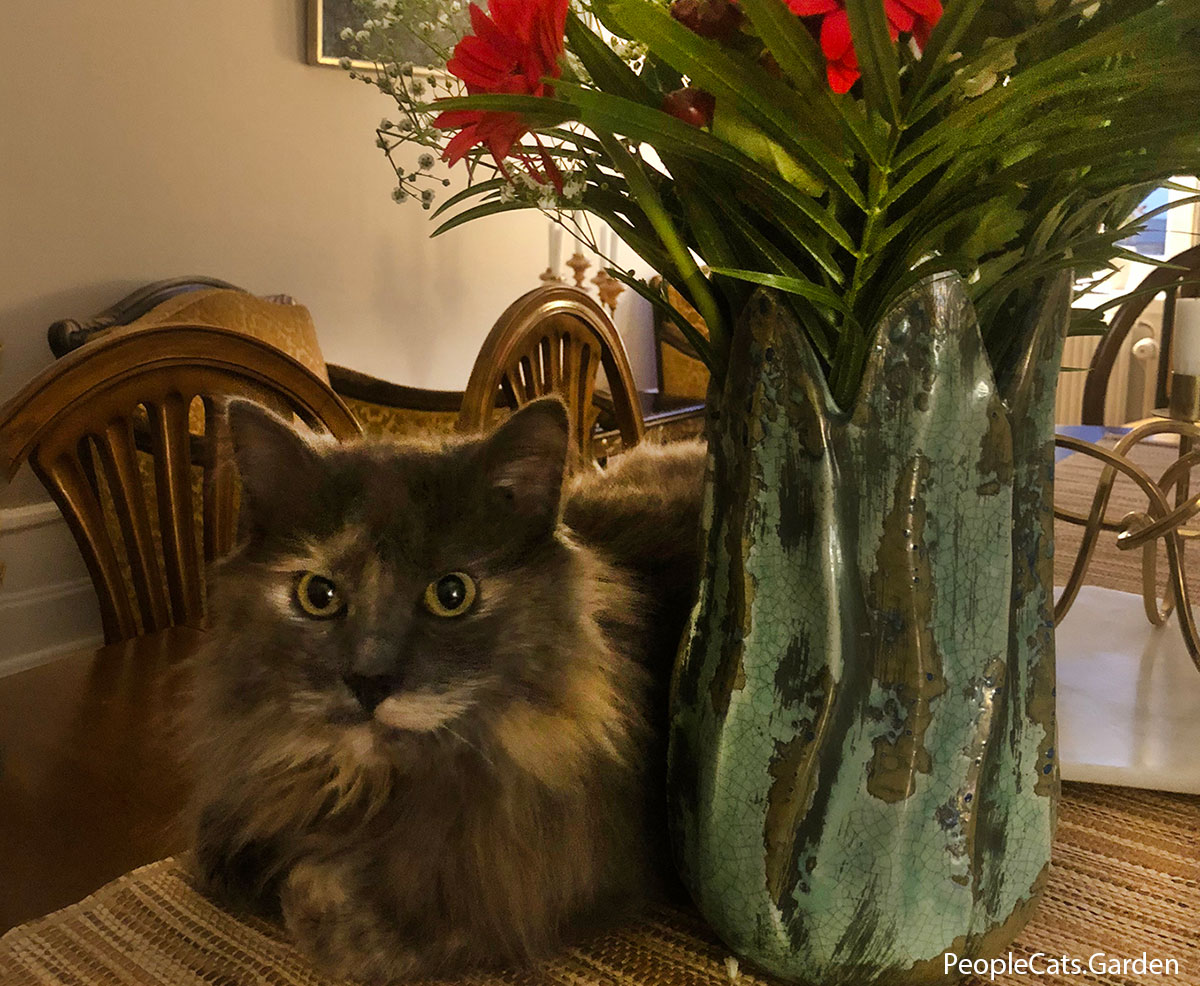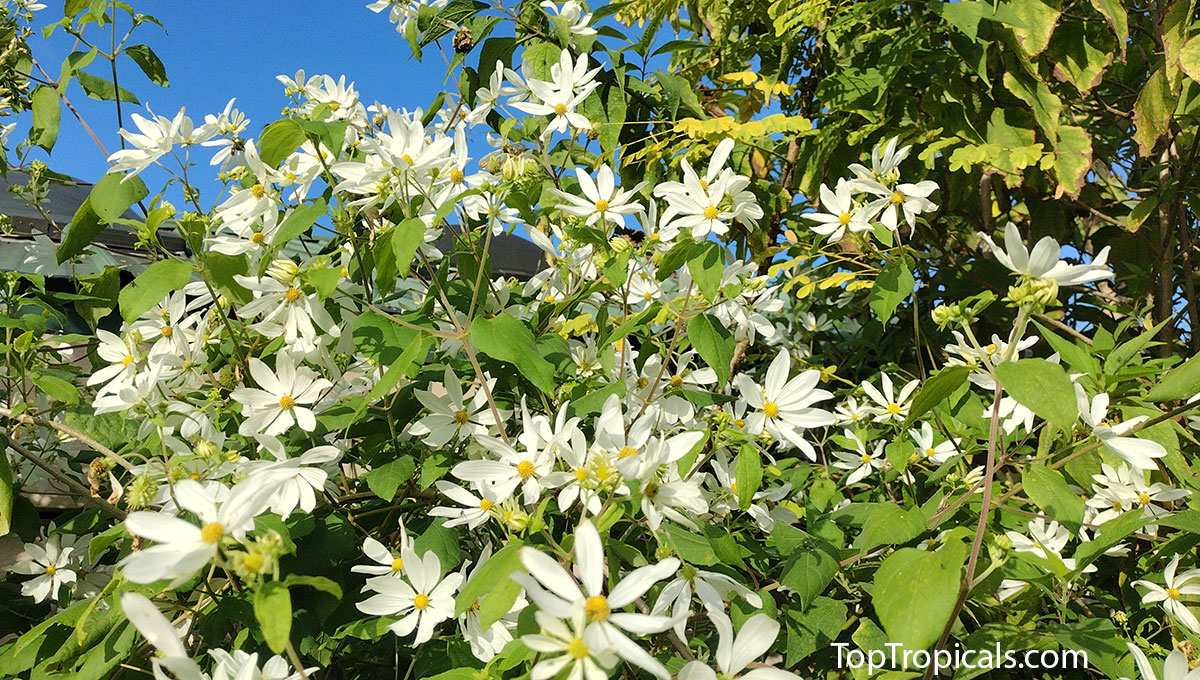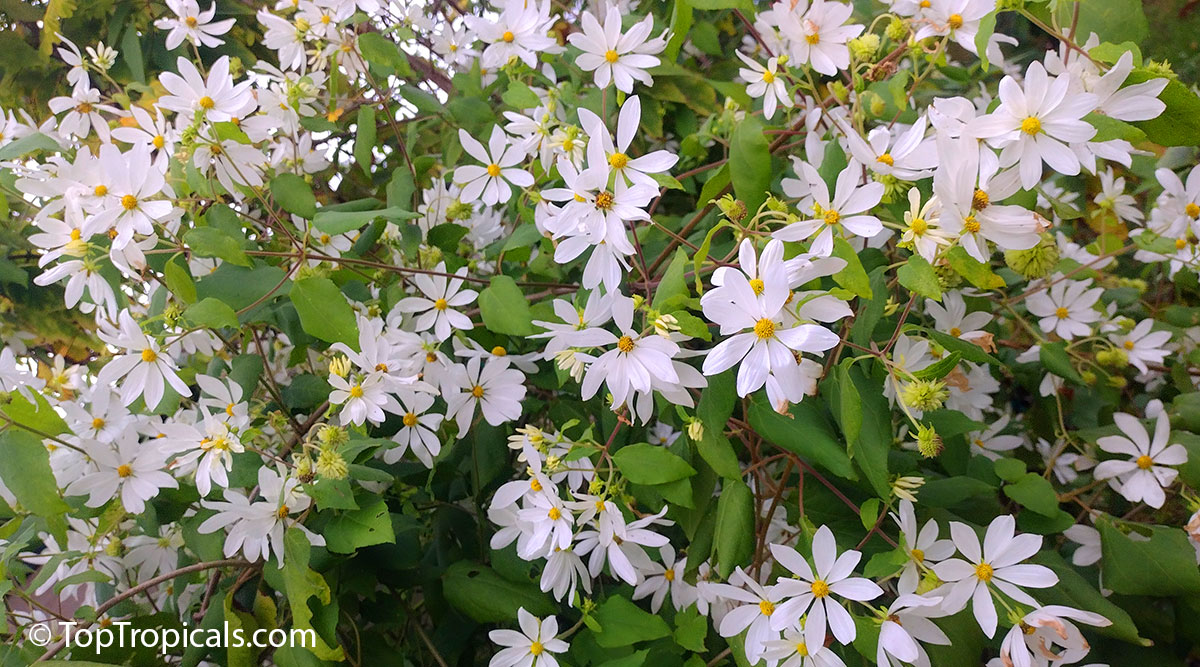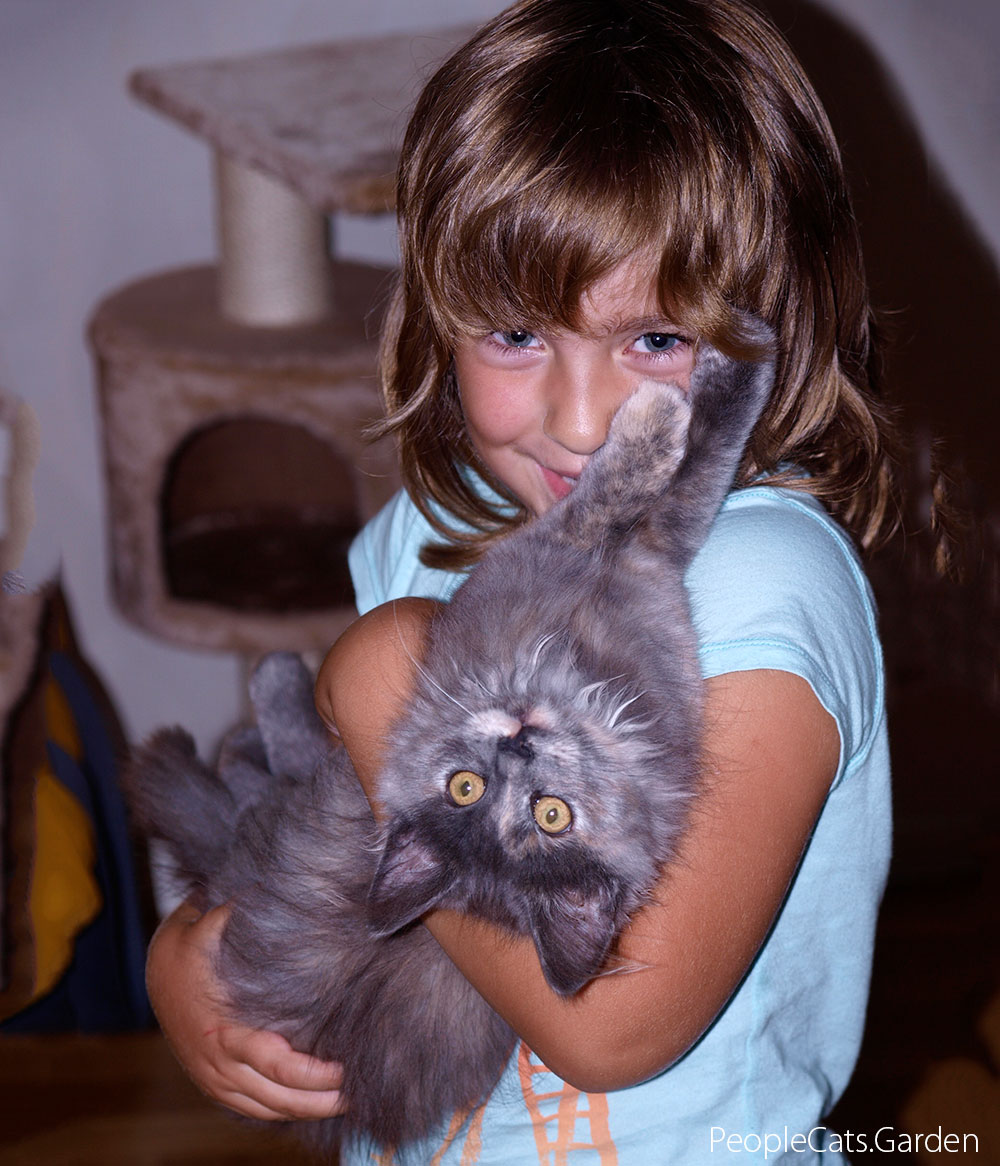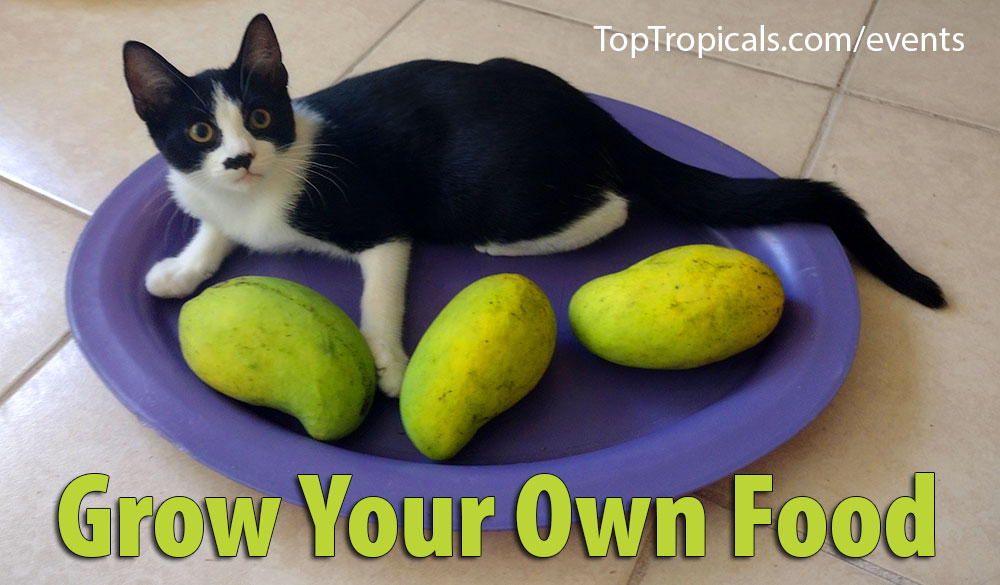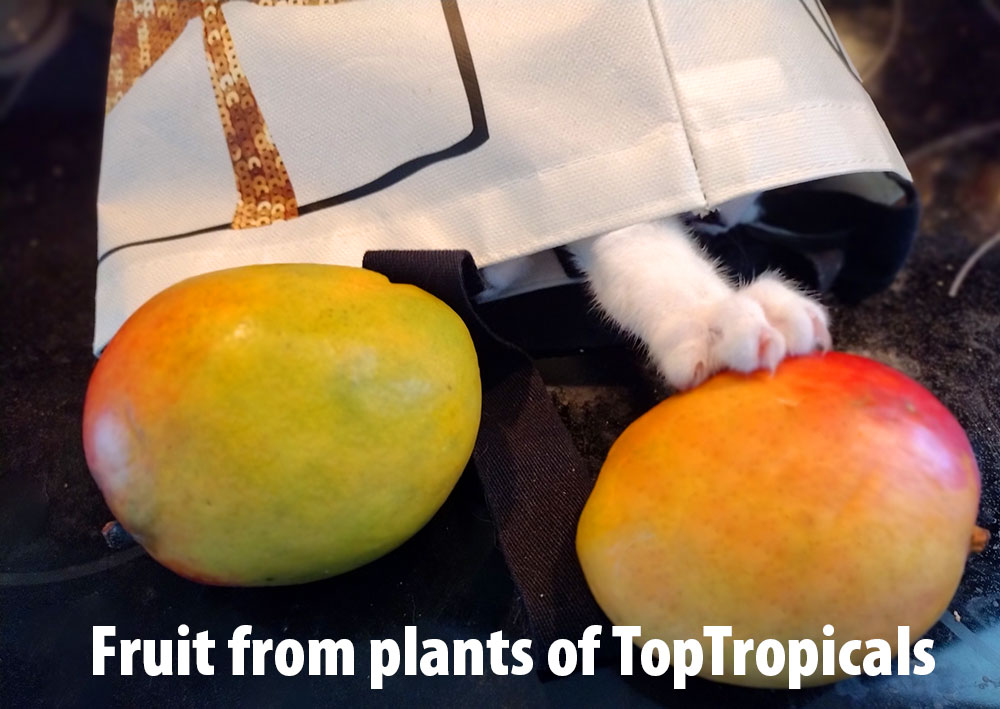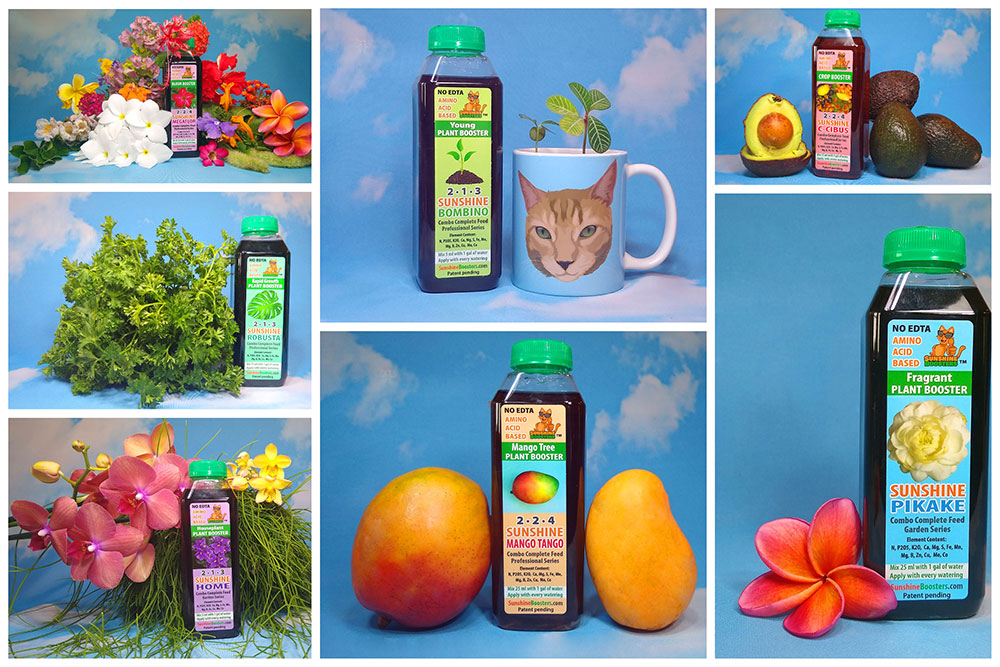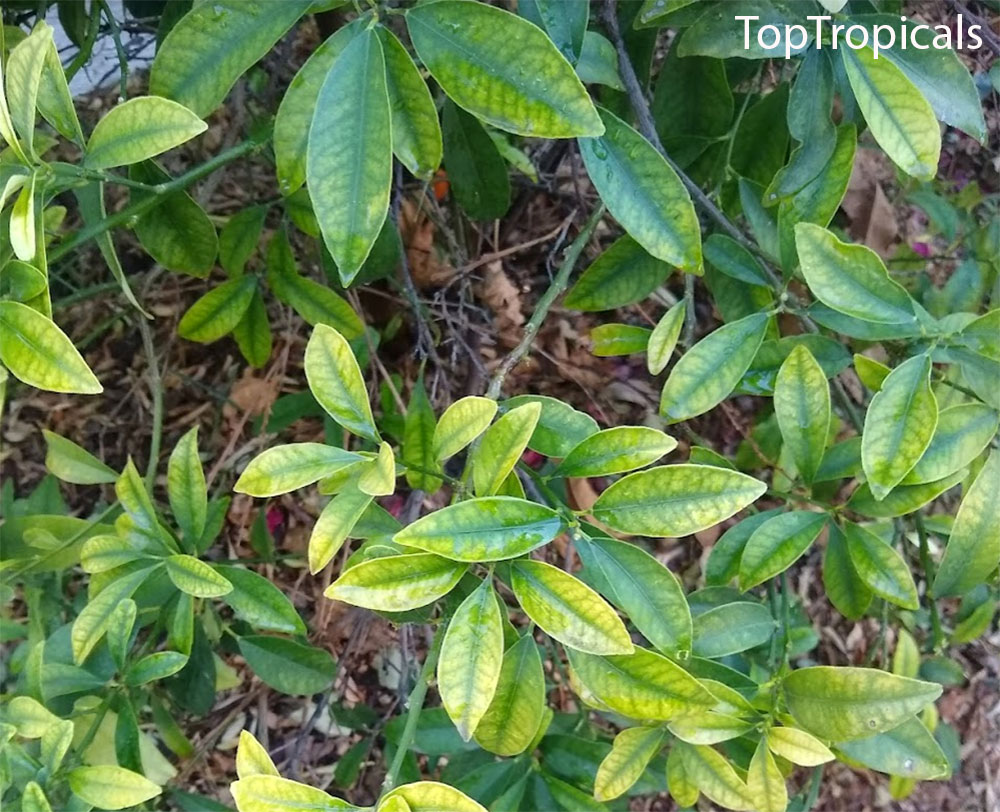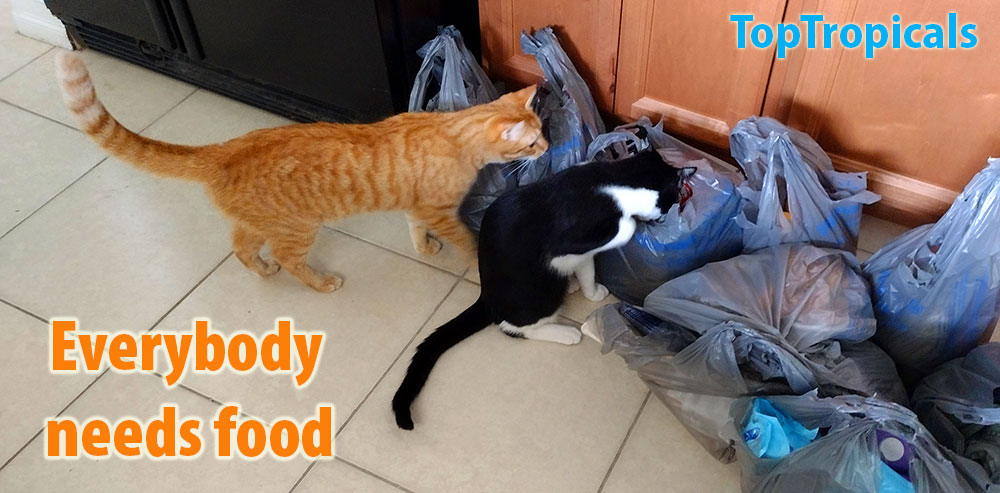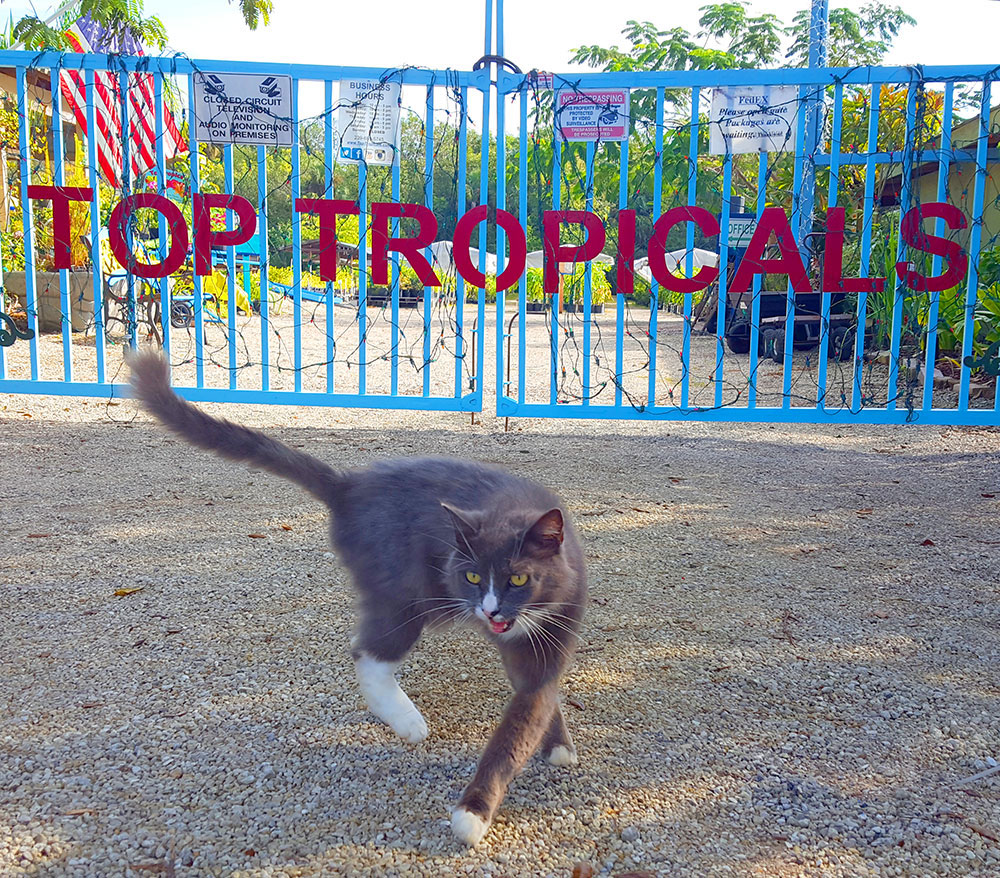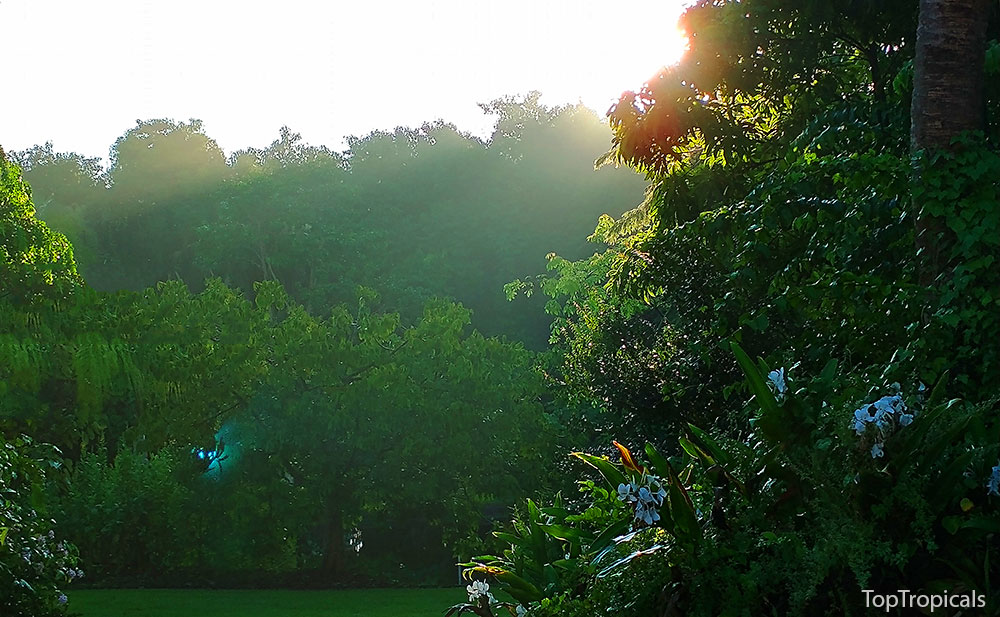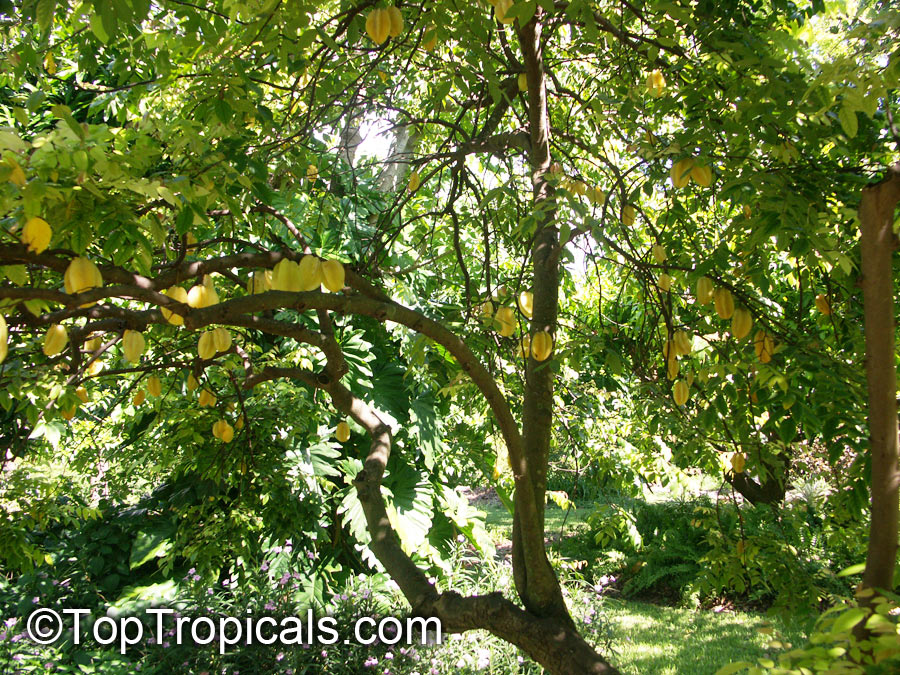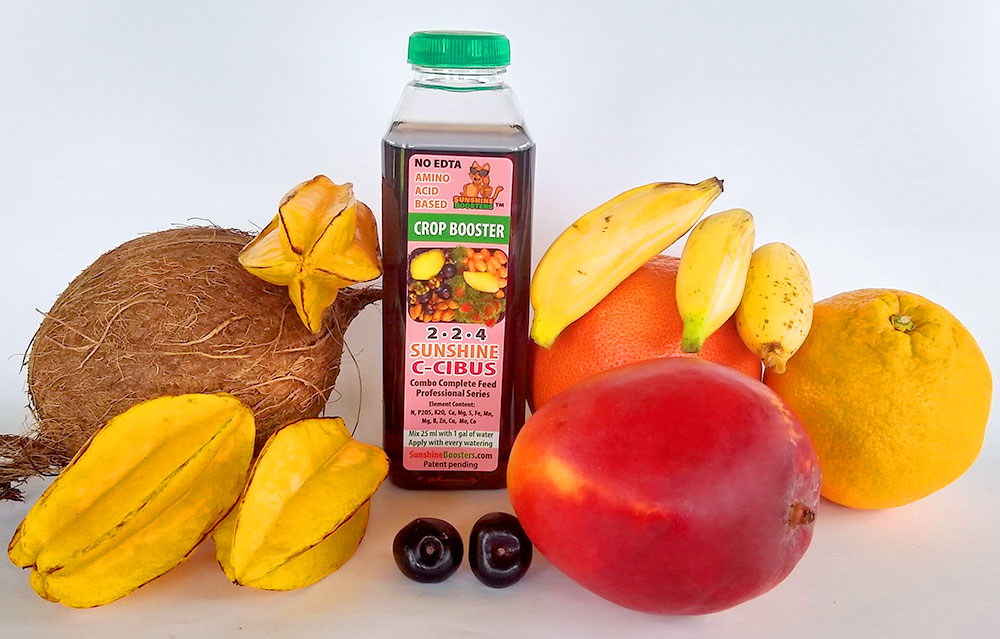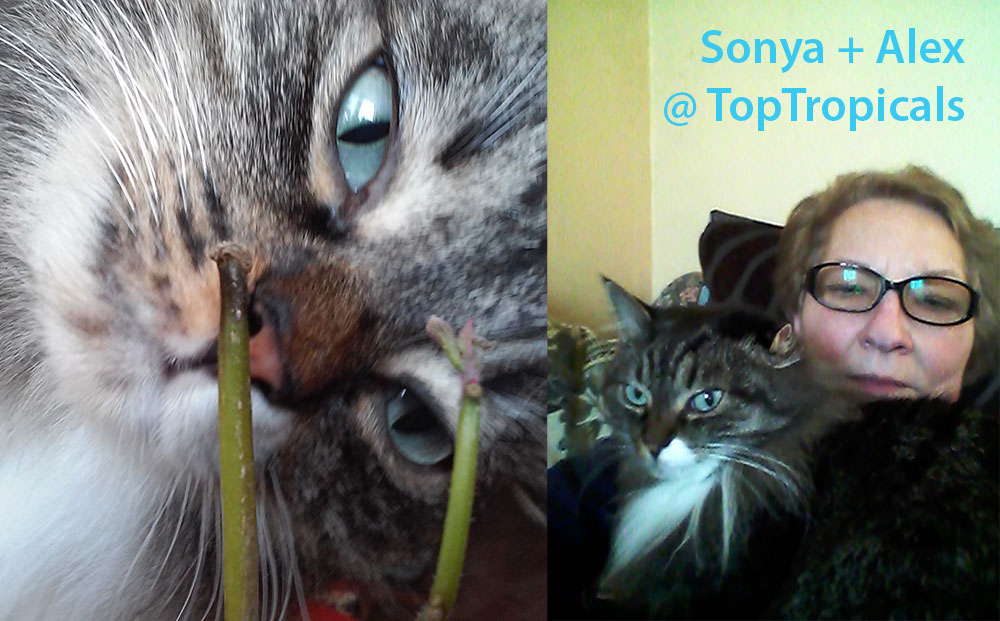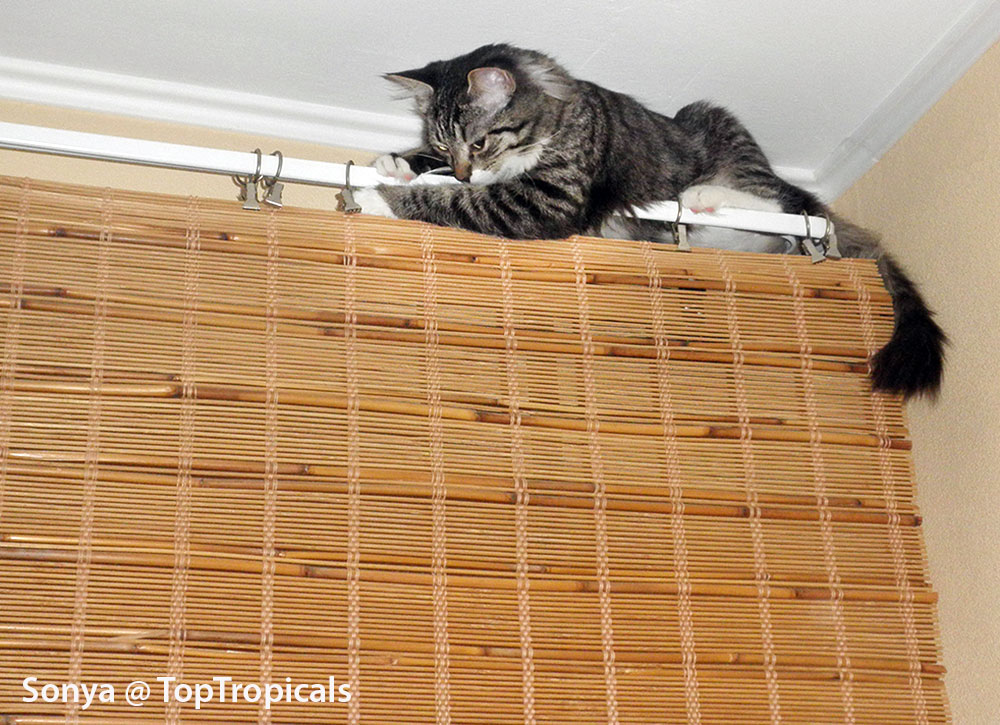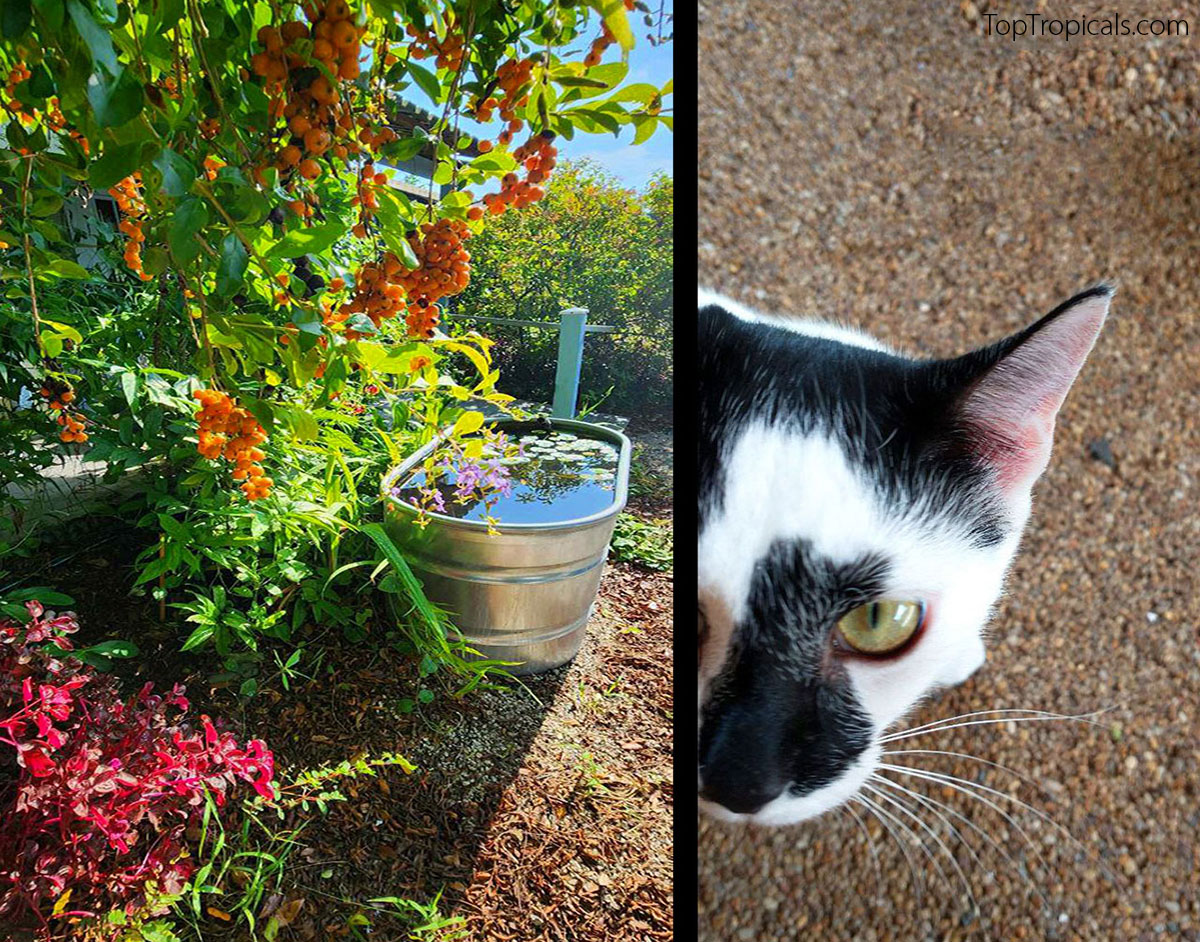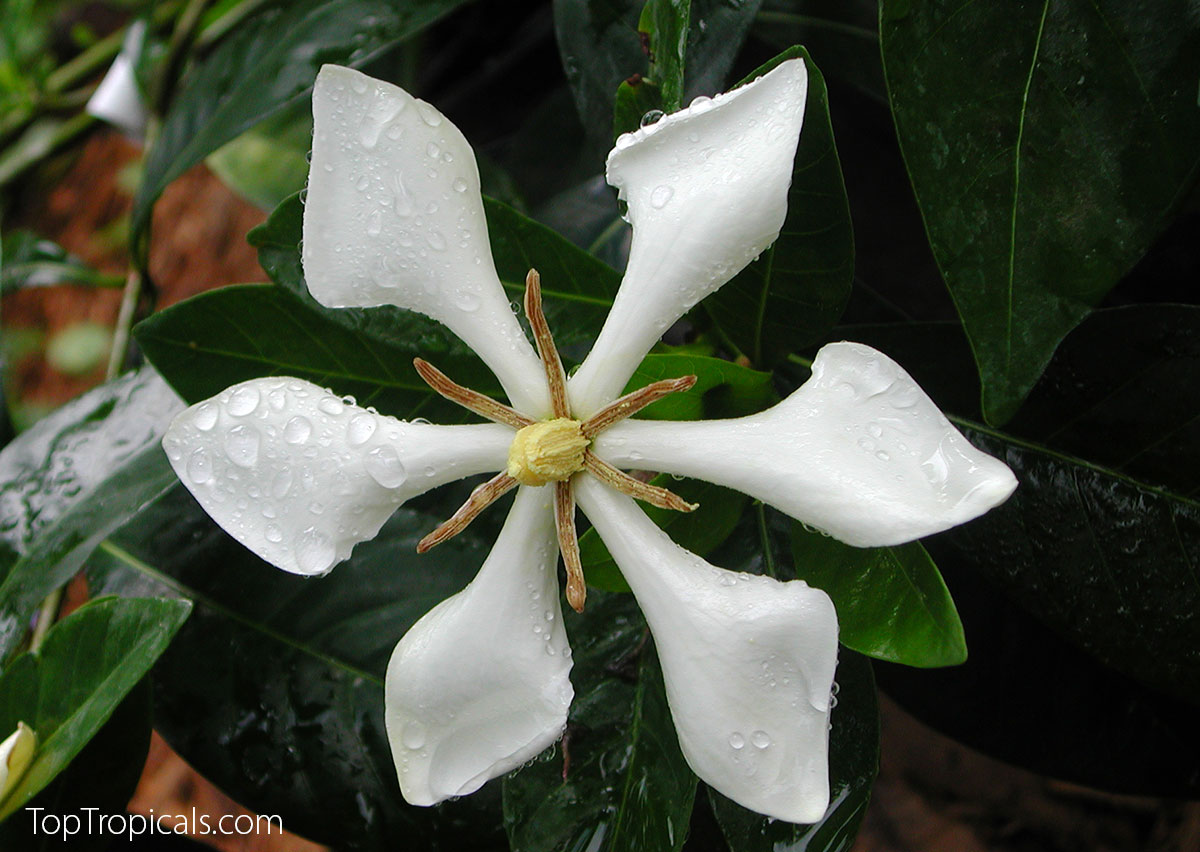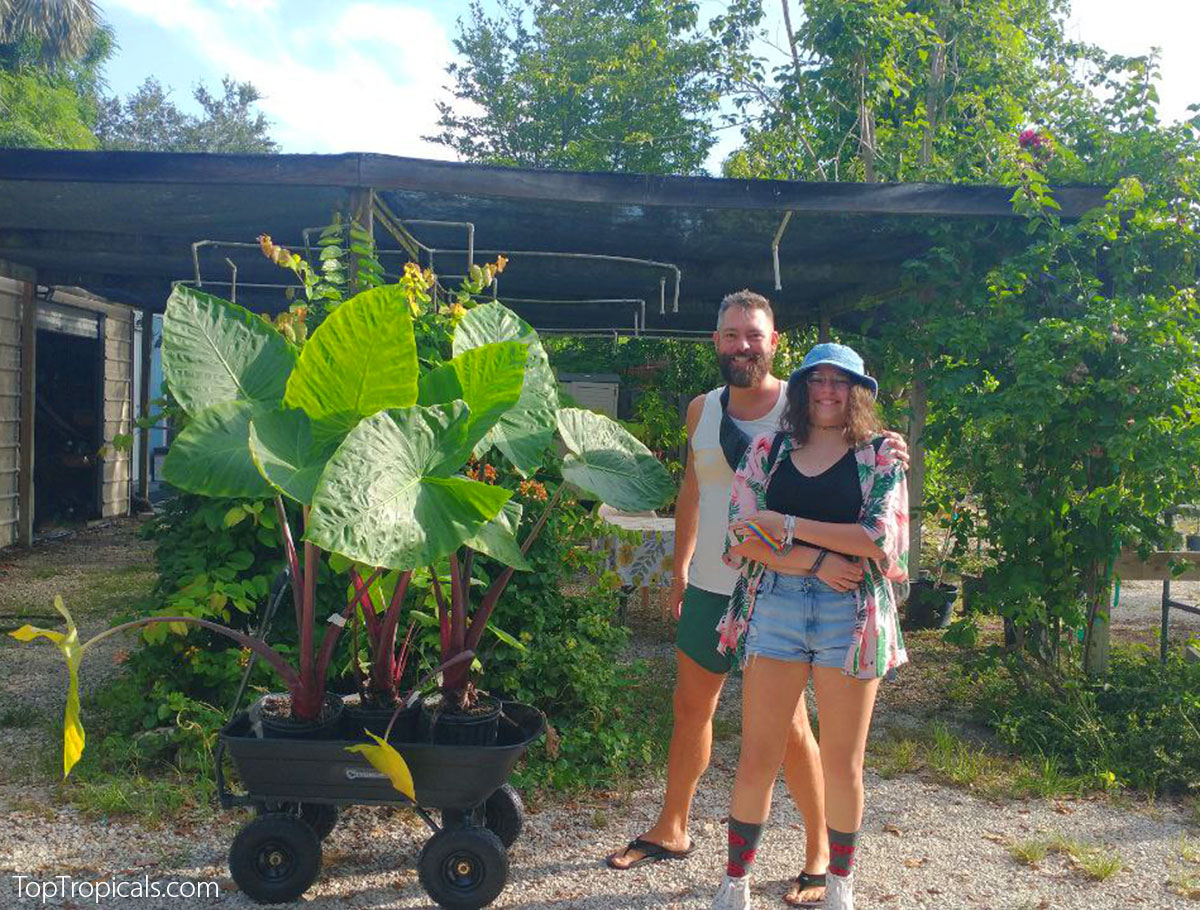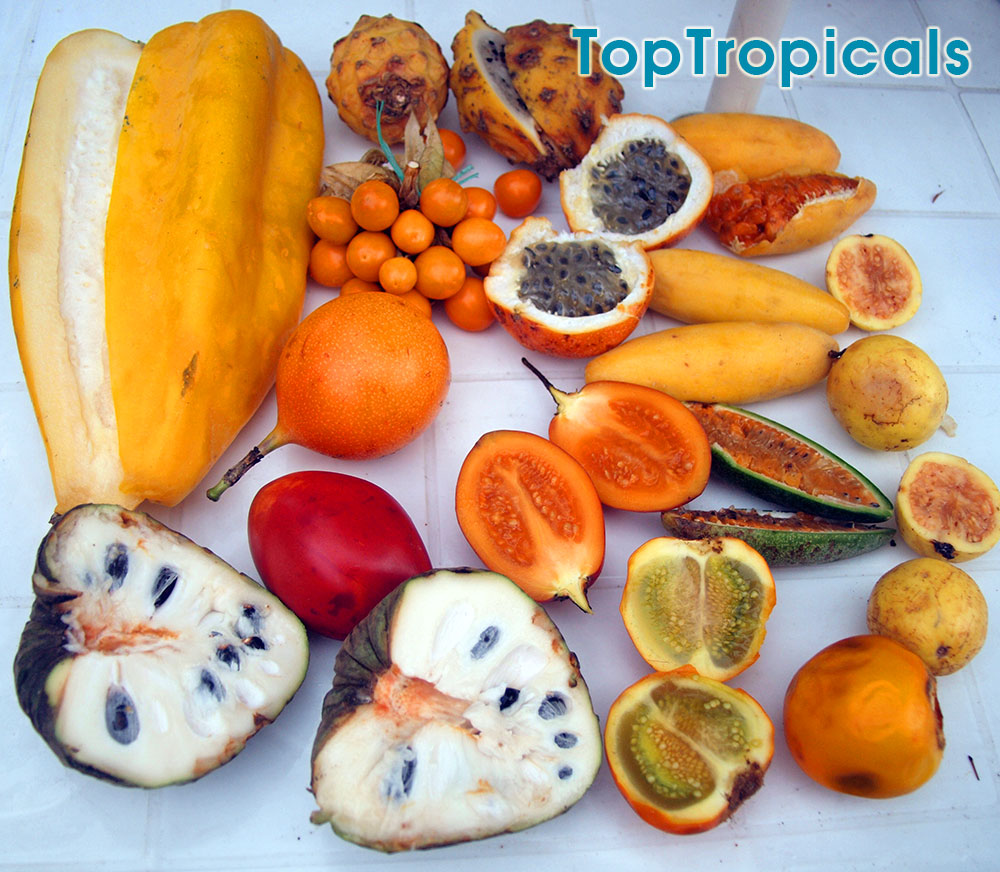Garden Blog - Top Tropicals
Date:
Cats in the
Garden.
Cat Breed: The Norwegian Forest Cat - Skogkatt
By Alex Butova, the Witch of Herbs and Cats
Meet the cats around us - they're our friends, protectors, and magical
mascots. They keep us healthy and can even save us in emergencies...
Winter brings a special time called the Solstice. It's when the earth
pauses its yearly cycle and starts a new one. This magical moment marks the
beginning of something enchanting...
Let's begin with the Norwegian Forest Cat. It's a mysterious and northern
feline friend, also called Skogkatt. It's like the wildcats in Scandinavian
fairy tales...
Skogkatt's favorite flower
What's Skogkatt's favorite flower in their homeland? Viking Poms, small yellow daisies. But in more southern regions, Daisy Trees - Montanoa - serve as substitutes, reminding them of their distant Northern homeland.
Montanoa atriplicifolia - Tree Chrysanthemum, Tree Daisy - one of the most impressive winter bloomers.
Date:
Cat of
the Month:
Winter Adventure of Lisa the Cat
After publishing the story about Skogkatts - Norwegian Forest Cats, we received inquiries about Lisa, if she is available for adoption? Luckily, Lisa now has her wonderful sweet home in Sweden, so unfortunately for those who fell in love with her, she is not adoptable. But Lisa's life story wasn't all that sweet and simple! Rather thrilling and adventurous. So we decided to share her story with you...
By Alex Butova, the Witch of Herbs and Cats
"...Lisa, who illustrated our story about Skogkatt Cat Breed, lives with my daughter Vanda, along with her family: husband Vitaly and two children - Max and Maria. They live in Sweden. Lisa is 13 years old now. About 10 years ago, Lisa had a heartbreaking adventure almost ended with a tragedy... But luckily, she made it through. However, since then, she can't jump high and sometimes walks funny, sways and limps... And here's what happened..."
Date:
Grow Your Own Food...
Affordable for everyone!
Grow Food Not Lawns - this is the theme for our Garden party. But it's much more than that. It's a philosophy and a
state of mind. One that more and more people are adopting as the world's food
supply continues to dwindle and get more expensive...
Like all things plant and garden related, each of us can adopt this state
of mind at whatever level we're capable of and comfortable with. Many of our
customers just want to start small and see what it's all about. After all, the
world of tropical plants can be more than just beautiful, it can be
sustaining as well!
Growing your own food is more than just about price, it's also about quality, choices and availability. As you watch the choices, and quality of store bought food go down and prices continue to go up, maybe it's time to grow more of your own food?
Fun Facts
- A mature mango tree can produce 200 to 300 fruit per year
- A single avocado tree is capable of producing 500 avocados in one
year
- A mature papaya plant can produce as many as 100 fruits per
growing season
- One longevity spinach plant can provide you with a fresh supply of
healthy spinach leaves all the time!
At Top Tropicals we offer a wide selection of fruit, including mango and avocado, and even spinach to get you started and to continue down the road on your own self sustaining journey. Even better, to help you with your food project, we have not only added to our varieties, but we have reduced prices on many items to make it even more affordable and enjoyable!
Who is cutting prices in today's world?! - We are, because...
...it's important that we do what we can to make it easier for our customers!
We have Avocados starting at only $49.95 and Mangos as low as $79.95, with dozens of varieties in stock! Use our discount coupons to save even more, and if you're local or in Fort Myers, stop by our Garden Center and save even more!
Date:
The best Aquarium fish food ever - stikiStik
Everyone knows that Top Tropicals is good at unique, special novelties.
And it is not a secret that most plant people also are pet people - cat
people (with PeopleCats), dog people (with PeopleDogs) or at least fish people,
right?
Today we are excited to introduce our new revolutionary Fish Food developed
by our business partners at Floritin Aquarium Labs
Floritin stikiStikâ„¢ - Ultimate Aquarium fish food
StikiStik is a dry powder that you just mixed with water to create a sticky paste. The paste can be attached to any surface inside your aquarium.
StikiStik is a patent pending fish food that does things which conventional fish food does not. It introduces picky eaters to a more natural feeding environment, does not pollute the fish tank, is easy to mix from its powder format and provides gradual feeding. It is easy to apply to any surface in the aquarium, such as interior glass wall, rocks or coral skeleton.
stikiStik advantages
- Easy to use. Just mix with a few drops of water and stik it in!
Self adhesive paste can be applied to any surface. Stays intact for hours in
aquarium. Does not pollute water
- Scientifically designed and proven for all types of aquarium fish,
invertebrates, and corals
- Optimal and balanced nutrition. Contains vitamins and amino
acids
- Natural. No hormones, no artificial colors
- Stimulates fish appetite and enhances fish color
- Promotes natural feeding habits. Helps training hard to feed fish.
The perfect food to acclimate newly introduced fish, including Moorish Idol,
finicky butterfly fish, such as Copperband Butterfly, Pearscale
Butterfly, Mandarinfish, and many oithers
- Easy to store. Can be used immediately or frozen for future use
- Add any frozen fish food or medications to mix
See element contents / instructions and more information with videos on stikiStik website
- Mr Booster -
Date:
Fertilizing in Fall:
Plants need food too!
Q: I know that I am not supposed to fertilize plants in winter. But I just bought several ground orchids from you, they are blooming now and I wonder if I can give them some food to support their bloom energy? When should I do the last application of fertilizer? I will keep them in a sun room during Winter until Spring.
A: Traditionally, end of October to November is the time when we
give the last dose of fertilizer to our tropical plants. Liquid fertilizers,
and especially amino-acid based Sunshine Boosters, are safe to apply year around. This means, you can
continue feeding your plants with Sunshine Boosters through the Winter without
risk of over-feeding or burning roots. Why?
The answer is very simple: even with their metabolism slowed down in
Winter, plants will use all that food.
Sunshine Boosters have special mild formulas that are scientifically
designed and based on Amino Acids. Plants will use all essential elements from the
solution as needed.
Liquid fertilizer is diluted in water, and will be applied only when you
water the plant. During Winter, water needs are lowered = watering times are
less frequent, with less amount of water = the plants will get less water and
less fertilizer accordingly.
Importance of micro elements
in combination with plant food during winter
In the photo: winter chlorosis on Kumquat leaves that is very hard to treat and should be prevented instead
Keep in mind that feeding your plants regularly during Winter will help to avoid "winter chlorosis" and other deficiency problems. So called "cool-temperature-induced chlorosis" (CTIC) is especially common in Spring on young, actively growing leaves. Unless chlorosis is prevented by micro-element applications, affected leaves may remain in this condition for the rest of the growing season.
Make sure to select proper type of fertilizer for your over-wintering plants. We have special formulas for foliage, flowering plants, fruit trees, young seedlings, even for for orchids and bromeliads. Check out our selection!
Date:
PeopleCats Botanical Garden Grand Opening
Guided tour with Mark Hooten
Top Tropicals Garden Center is pleased to invite you to visit our new PeopleCats Botanical Garden on the grounds of Top Tropicals in Ft
Myers. It is named in honor of the relationship with our beloved Cats, who we treat like People. You'll see our Garden PeopleCats roaming the property. As a matter of fact, they rule
the garden!
The Garden has many mature trees and plants so you can see what they look like before your purchase them in our Garden Center. And of course, our
PeopleCats will be guiding you in the Gardens!
Photo above: blue light in the forest - TopTropicals Garden Ghost, the spirit is always watching!
Date:
Healthy Plant Food
Q&A from Mr Booster
Plant food for a Star Fruit
Q: I have 2 Starfruit plants from you. One on the left is B10 has a lot of flowers but no fruit is developing. On the rite is Kenjeng. This one has no flowers at all. Both plants are growing very well. Plenty of sun and water. I am located in Boynton Beach Florida. So what to do?
A: Your trees on the pictures look very healthy, congratulations
with a great care!
Starfruit, as well as other grafted fruit trees (like mango, avocado, etc)
usually flower/fruit easily and readily while in pots in the nursery.
Sometimes, once planted in the ground, they may reduce flowering or even stop
flowering. What happened?
The answer is simple. In pots, we fertilize them on regular basis. In our
nursery, we have fertilizer injector inline with irrigation system that dozes
plant food with EVERY watering. In other nurseries, they may also use
slow-release fertilizers, but it is still a regular routine to provide plant food to
potted plants.
In the ground, especially in Florida poor soils, fruit trees may stop
flowering or delay fruiting due to lack of nutrients, or dis-balance of elements
in the ground. Without fertilizer, a tree may take extra time to develop
bigger root system to reach out for necessary elements, and eventually will start
fruiting anyway.
But we want it to fruit soon! The only way to fix the problem is to provide
fertilizer on regular basis for a young tree. It is especially important
during hot summer months when plant metabolism is fast due to high temperatures,
plus nutrients may get washed away with frequent summer rains (like we have
in Florida) even if you've added some fertilizer at time of planting.
You can use smart release fertilizer once a month during hot season,
this one or similar:
Mango-Food - Smart Release Fruit Tree Booster.
But the most effective way to get a tropical tree to flowering and
fruiting, is frequent applications of liquid fertilizer. We use Sunshine Boosters
with every watering on our plants. They work great even on hard cases and
weak plants, and you see the difference in a matter of weeks, sometimes even
days.
We recommend the following fertilizer that contains all necessary elements
for young fruit trees:
SUNSHINE C-Cibus - Crop Nutrition Booster
SUNSHINE C-Cibus - Crop Nutrition Booster from Garden Series, or Combo Total Feed Collection - all nutrients in just one bottle, for fruit trees and edibles.
Date:
Meet PeopleCats of TopTropicals. Cat of the Day: Sonya, the Co-Author
In our previous newsletter, you met our editor/photographer tandem - Tilda & Marina. Today we introduce our columnist assistant - Sonya. For the past decade, this True Norwegian Forest Cat has been a great helper and inspirational co-author for Alexandra, TopTropicals website writer and social media blogger.
Alex has been with TopTropicals since Day One (2003). In 2011, she got Sonya, a 3-month old kitten that someone kicked out: at that young age she already had quite a temper of a real Wild Cat. No one wanted to adopt her and Sonya was doomed to suffer a street life... So Alex invited her in the house... and it took her many months to teach Sonya some good manners! And Sonya turned into a beautiful and affectionate Purrrson as well as became the Boss in the house (what a surprise, duh) and Alexandra's dearest life companion. Sonya also discovered her talent in writing plant stories for TopTropicals, sitting on Alex's shoulder and whispering into her ear while she is typing Sonya's horticultural tips. And when Alex stares at monitors for more than 5 hours, Sonya lays on her keyboard saying: "Now get up and get some stretch lady! Let's go re-pot some plants for a change!"
We will be following up on Sonya's creative work, and you will hear from her again soon...
Check out and more Cat of the Day stories.
Date:
Growing Dreams and Happiness:
A Decade at Top Tropicals
By Kristi VanBenschoten,
Top Tropicals Manager
"The purpose of agriculture is not the production of
food,
but the perfection of human beings"
- Masanoby Fukuoka -
Working with Top Tropicals for the past decade, I frequently hear heartwarming comments from customers like, "Oh, wow, this place is breathtaking," "You must adore working here," "Isn't it marvelous to be in harmony with nature every day?"
The truth is, yes, all these sentiments hold true, and I genuinely cherish every single one of these comments; however... If you were to inquire about my most cherished aspect of working here, I would have to say that my absolute favorite part is when a husband calls and says:
"My wife and I embarked on a honeymoon five years ago, and we stumbled upon this exotic wonder called Helicona Lobster Claw. My wife was captivated by it. I would love to surprise her with one for our upcoming anniversary. Do you happen to have them?.."
...Or when a bereaved wife sends an email, expressing:
"My beloved husband recently departed, and he held a deep affection for Gardenias. I wish to plant one in our front yard as a living tribute to his memory. Could you kindly recommend one?..."
Or, it could be the heartwarming scene of a new father visiting with his young son, exclaiming:
"I have a dream of creating a bountiful food forest for my children with fruit and other edibles. I want them to experience the enchantment of watching food grow and to impart the wisdom of cultivating it. Can you guide me in this endeavor?"
Or the passionate plant collector who has spent years on a quest to acquire that one elusive specimen, the final piece of their adored collection. We spare no effort in locating it, and when we succeed, it fills me with an indescribable joy!
You see, here at Top Tropicals, we don't merely sell plants; we trade in precious memories, lofty aspirations, and vivid visions for a brighter future. We deal in dreams. These dreams are nurtured in pots with a touch of fertile soil and an abundance of love. This is the essence of what makes Top Tropicals so special to me:
We Grow Happiness…
Date:
When to fertilize and prune tropical fruit trees?
Q: Can tropical fruit trees (Soursop, Mango, Star fruit, etc) be given plant food any time of year? Also can they be trimmed this time of year/summer?
A: True tropical plants (including fruit trees) need plant food most of the year in real Tropics, where temperatures have very little fluctuations, and active growth season is close to 12 months a year. In subtropical areas when temperatures in winter drop below 65F, plant metabolism slows down, so it is recommended to fertilize only during the warmest period (March through November). So yes, Summer is the perfect time for fertilizing your trees; their metabolism is at the highest point and they can use more food!
Trim your fruit trees right after harvesting. Obviously, you don't want to prune branches before or during flowering or fruiting. The specific time of the year for pruning depends on the plant - every tree has its own flowering/fruiting season. However, avoid pruning right before winter: young shoots promoted by pruning are tender and can be cold damaged.
Recommended fertilizers for fruit trees:
Fruit Festival Plant Food - Super Crop Booster
Mango-Food - Smart Release Fruit Tree Booster
SUNSHINE-Honey - for sweeter fruit
SUNSHINE SuperFood - microelement supplement

